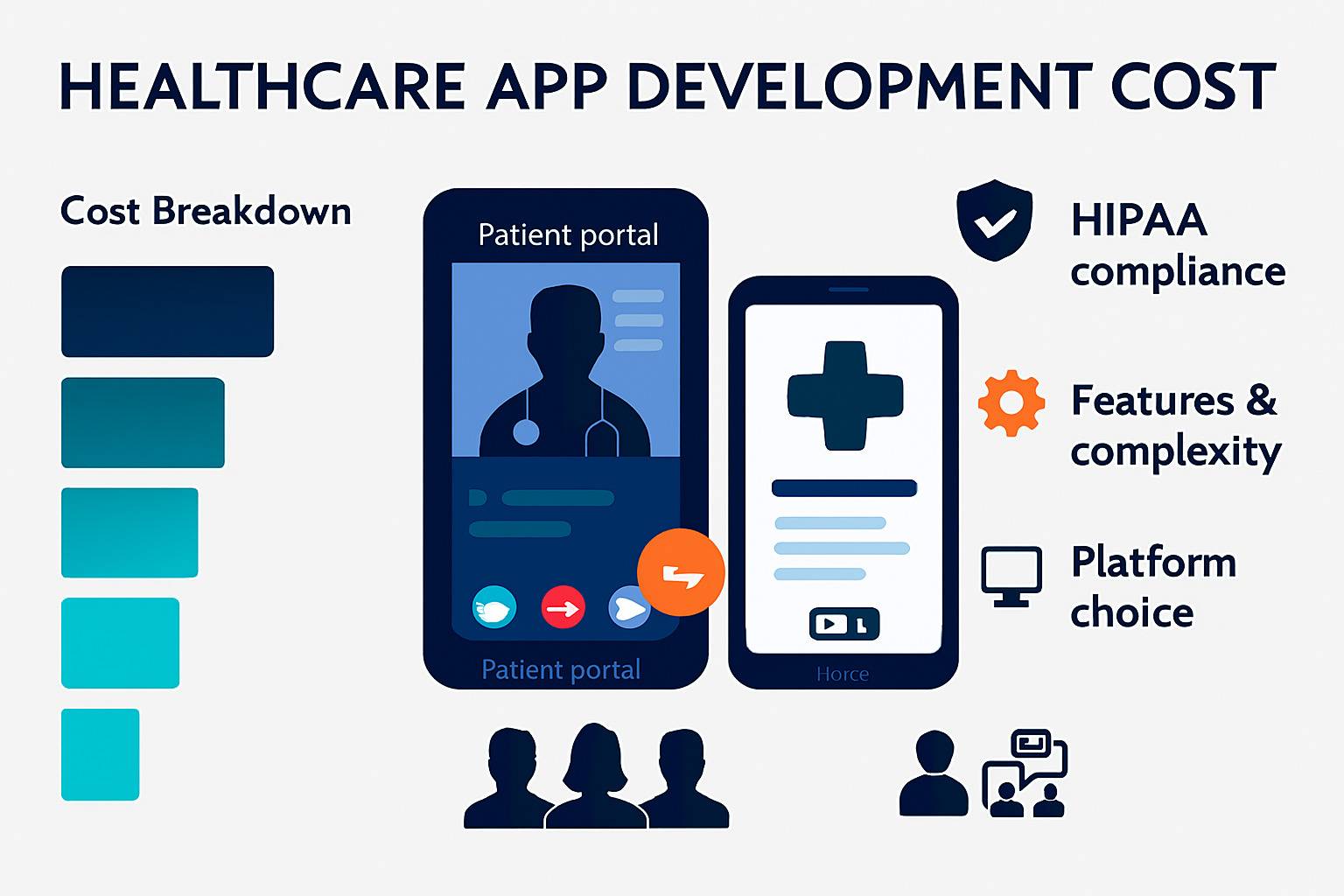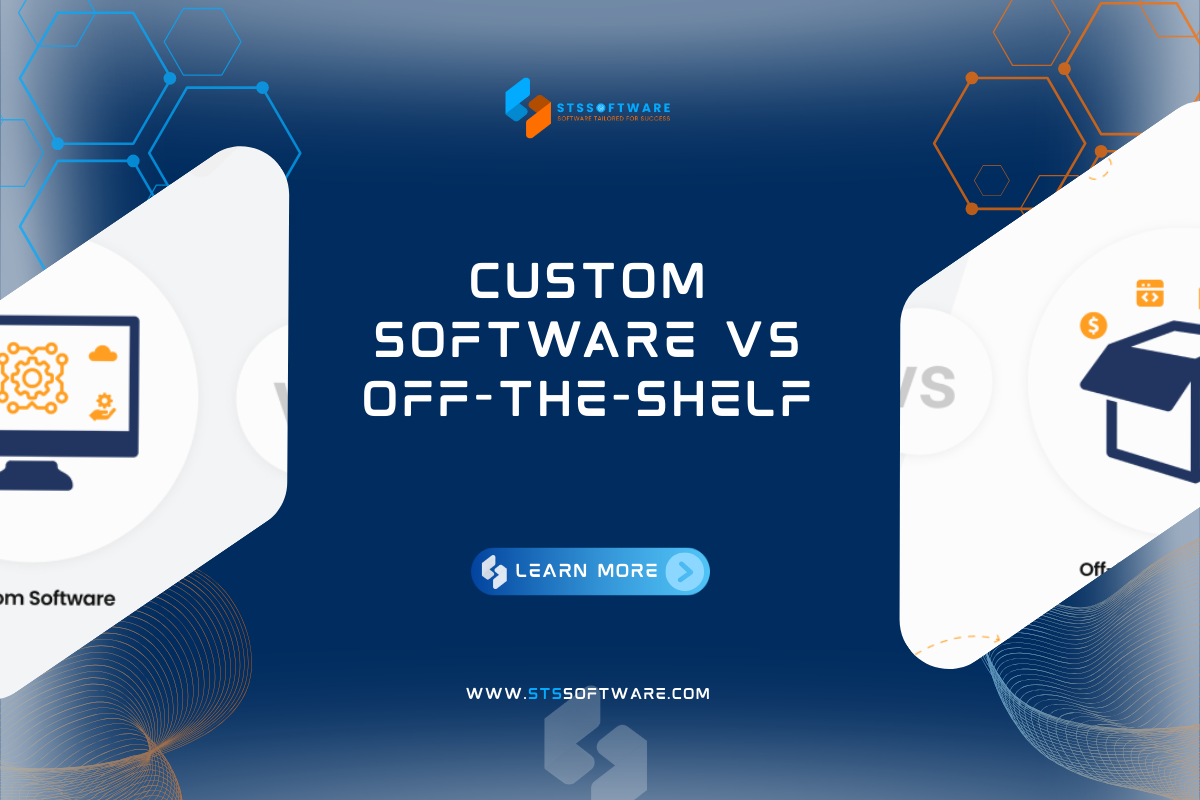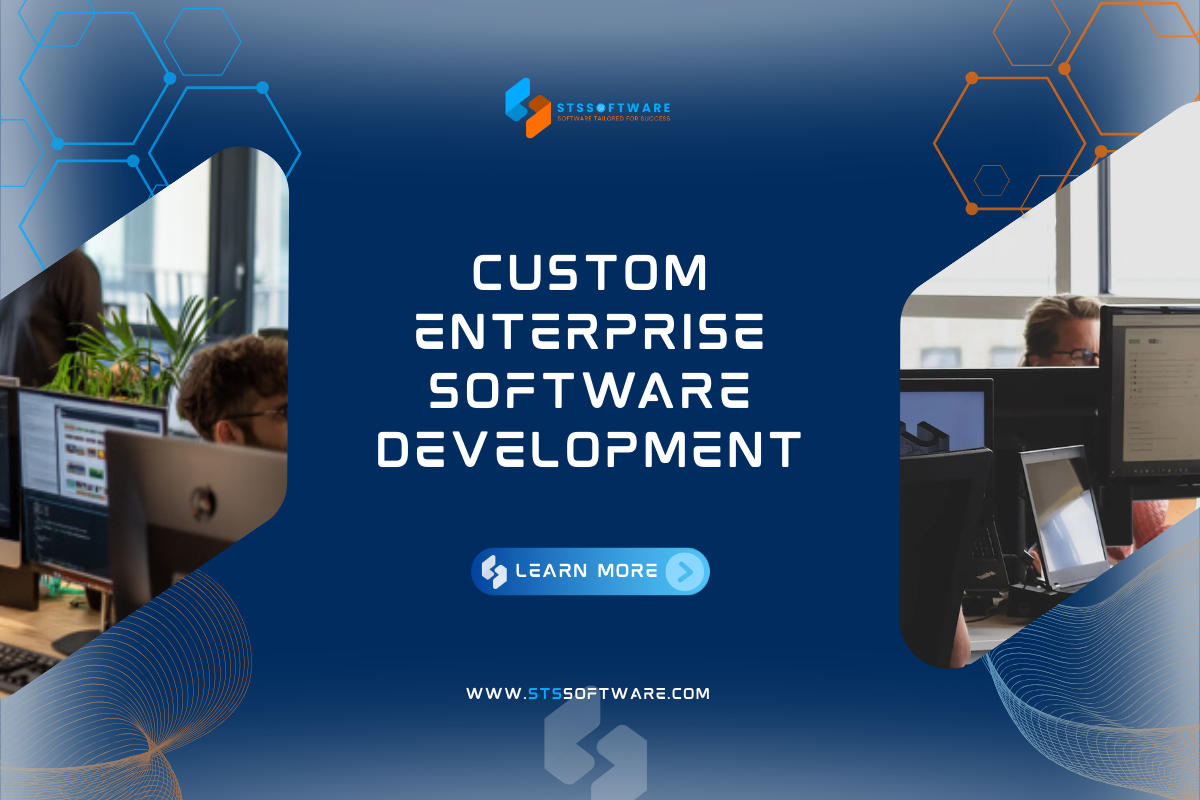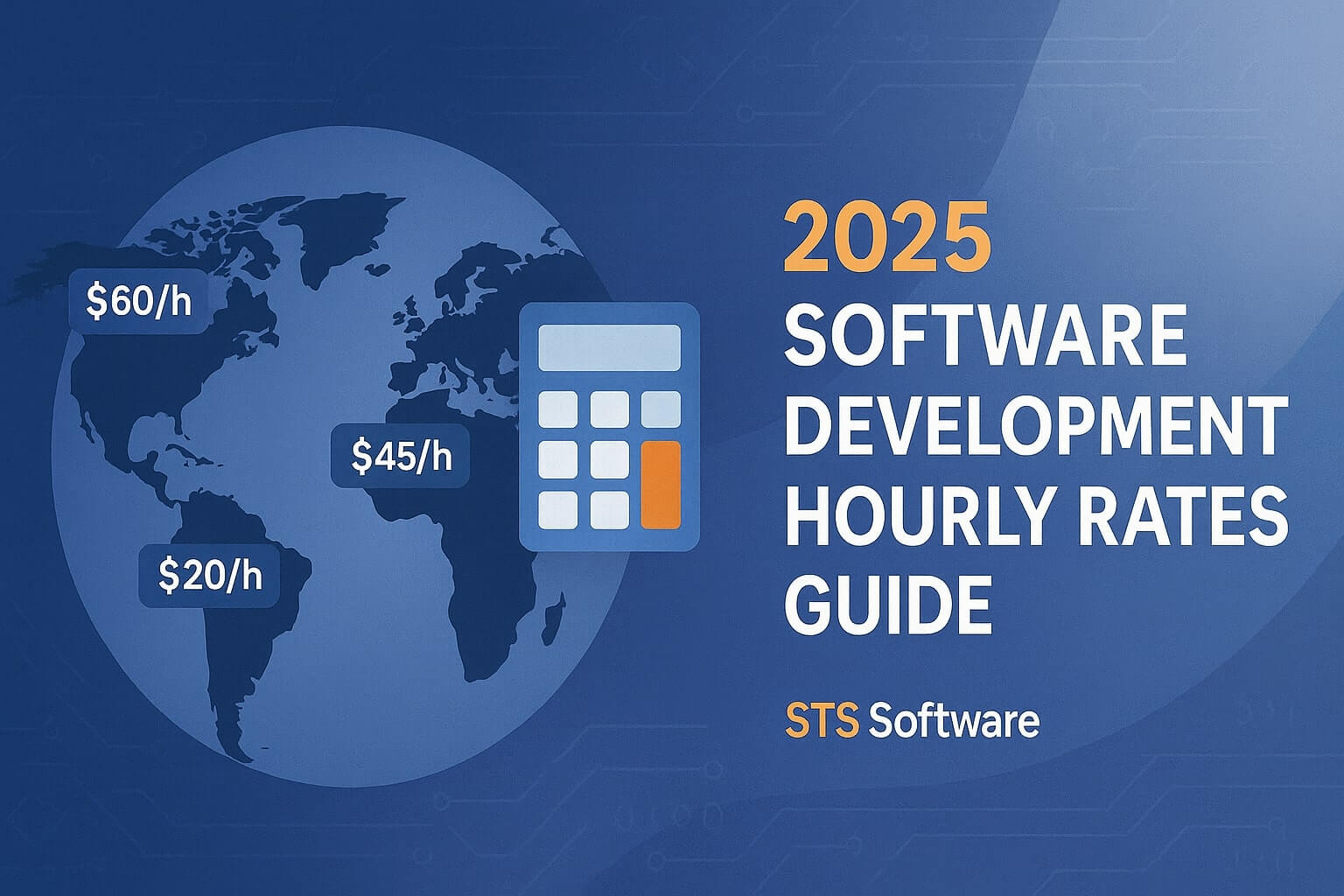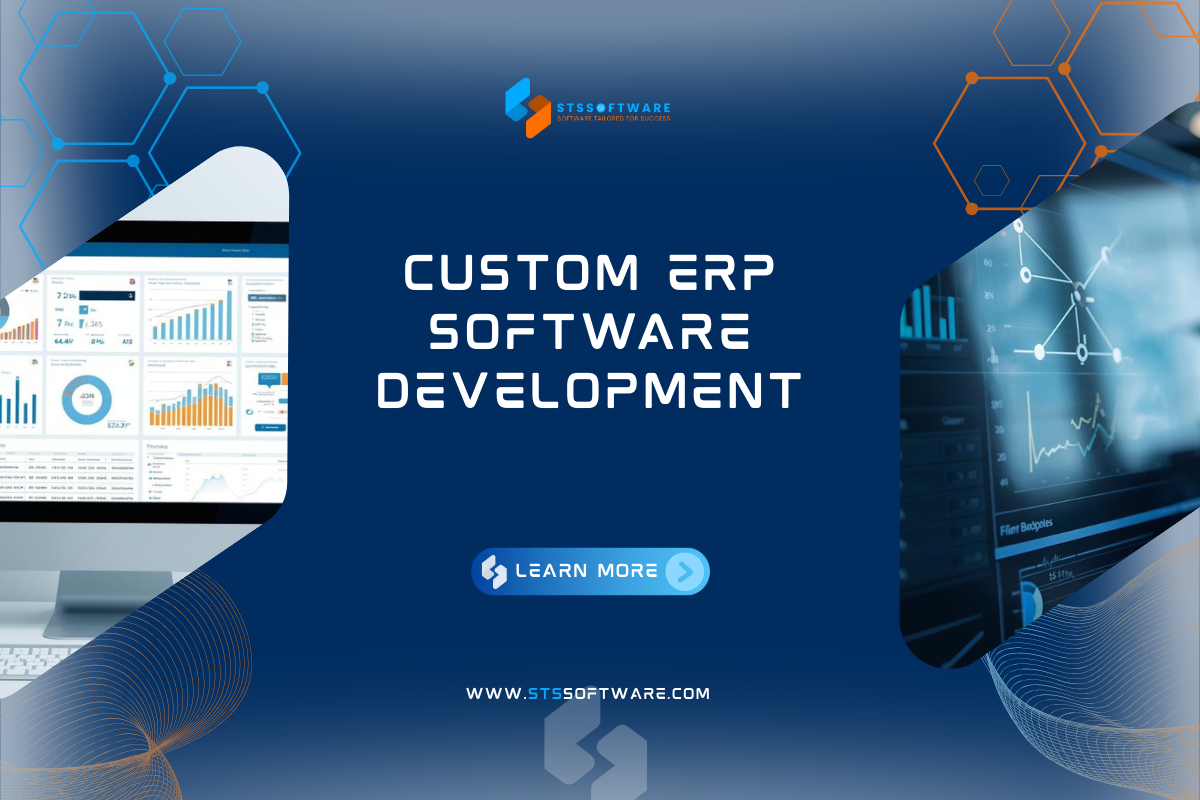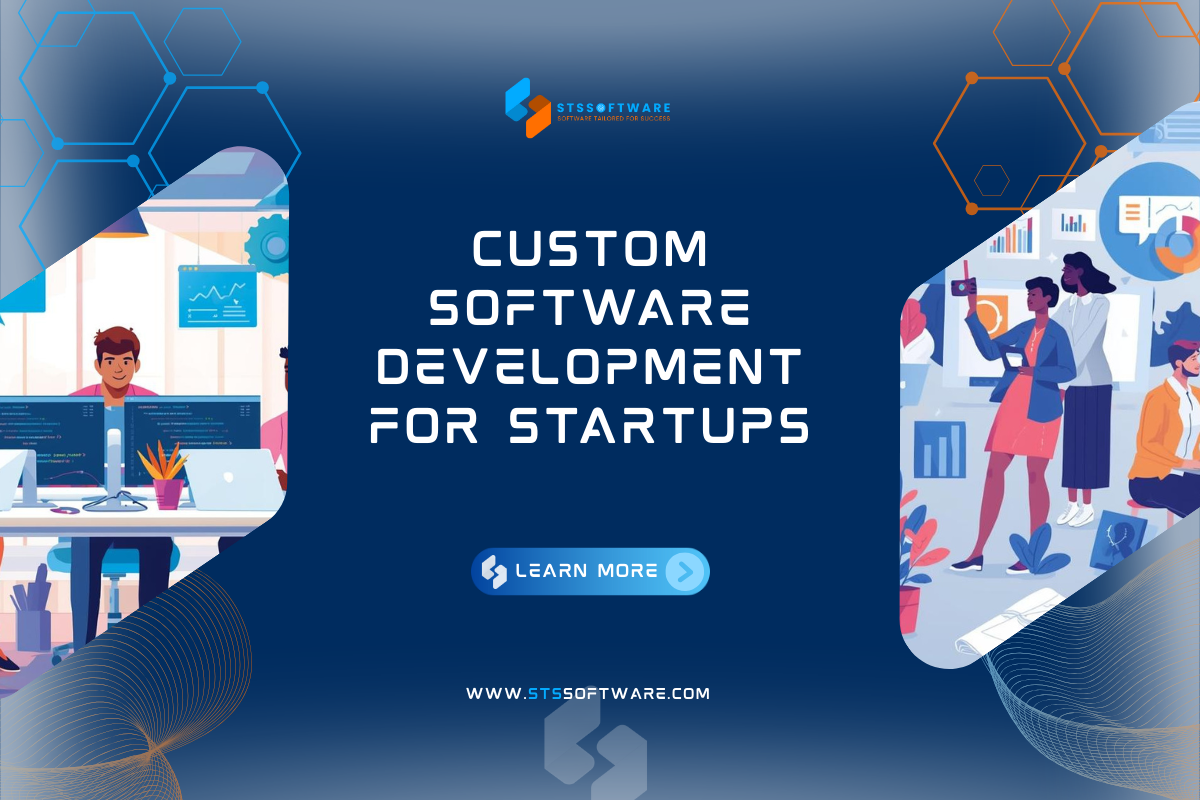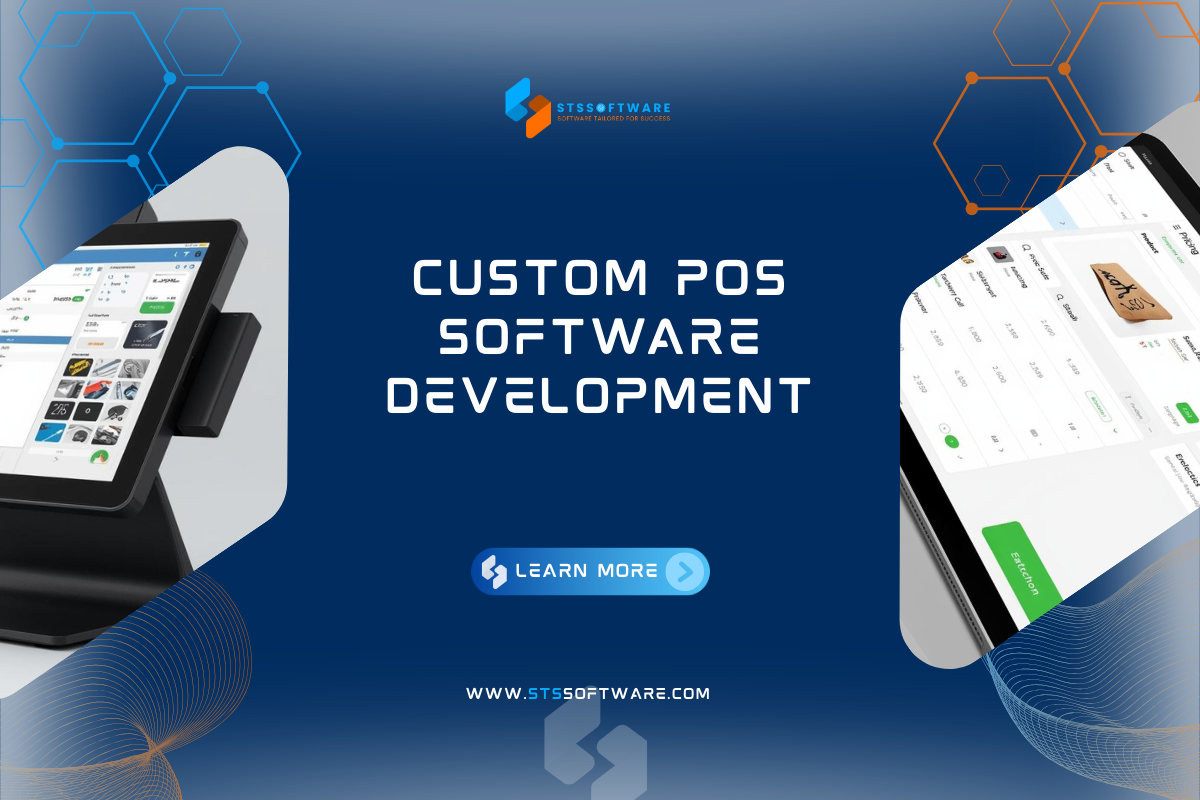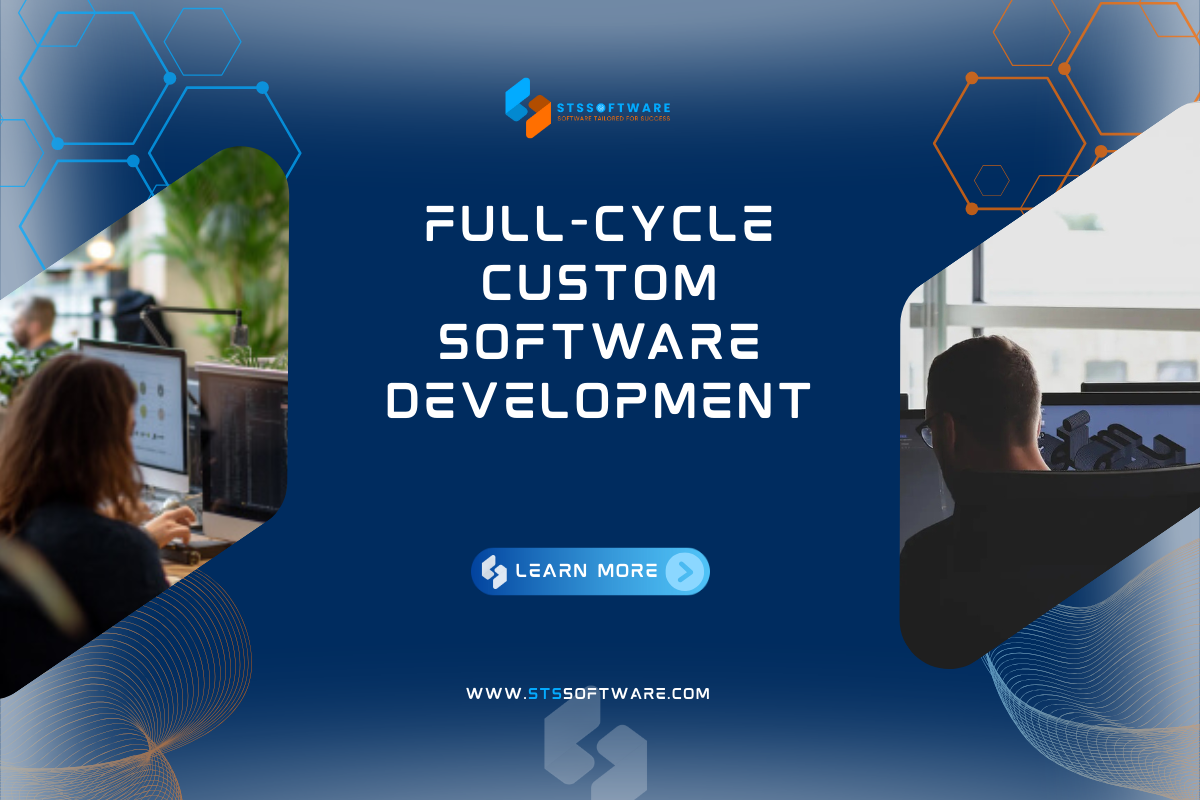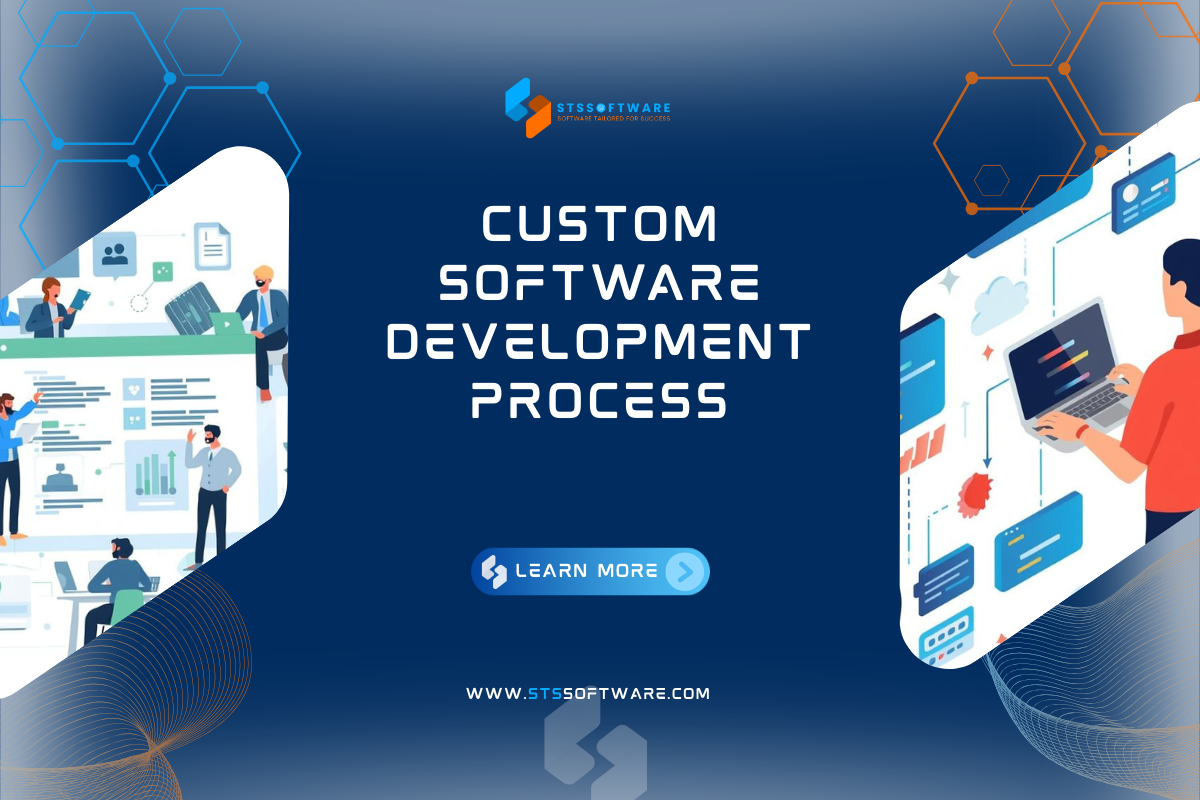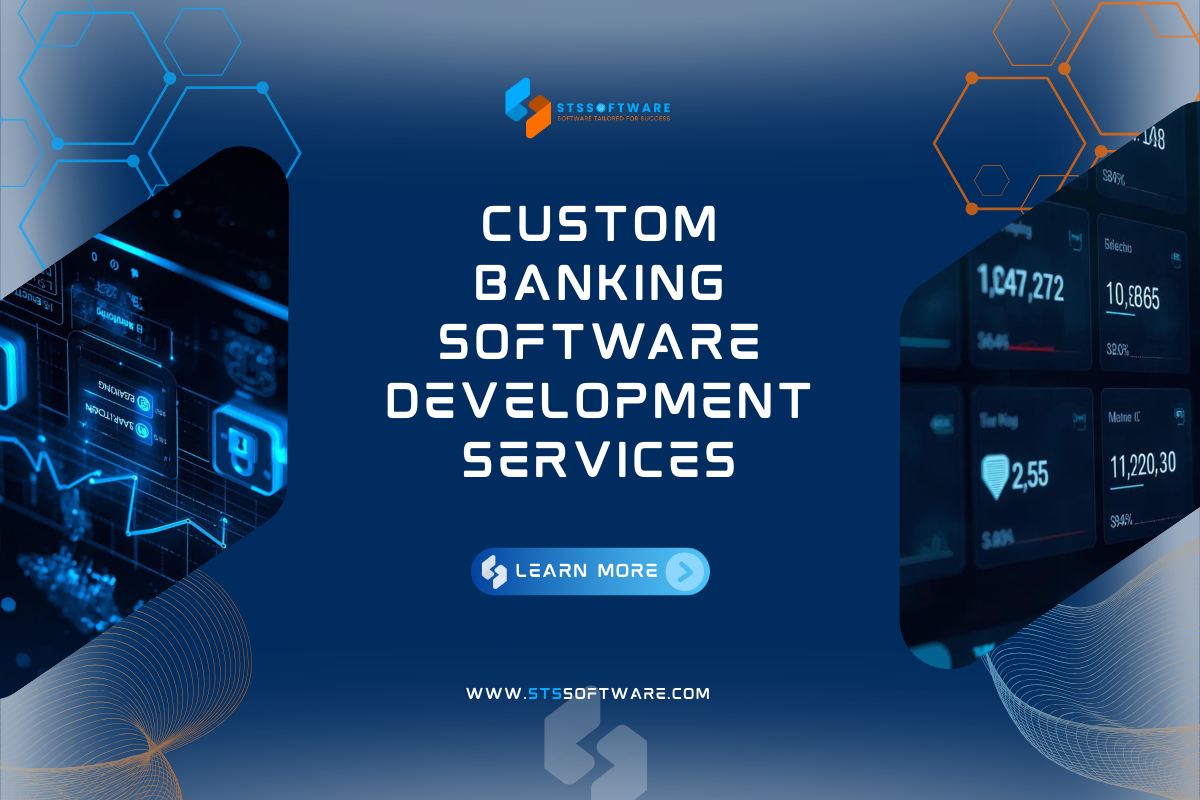Healthcare app development cost ranges from $30,000 to $500,000+, depending on complexity, compliance requirements, and feature scope. STS Software has delivered 100+ healthcare applications across telemedicine, patient portals, and enterprise EHR systems with proven cost optimization strategies over 13+ years.
Healthcare applications require specialized development approaches, including HIPAA compliance, medical device integration, and regulatory approval processes that significantly impact overall project costs. Modern healthcare software demands robust security frameworks, real-time data processing, and seamless integration with existing healthcare infrastructure.
Key Takeaways
STS Software’s healthcare app development cost analysis reveals essential budget considerations for successful project planning:
- Cost ranges by complexity: Basic MVP ($30K-$80K), Advanced apps ($80K-$250K), Enterprise solutions ($250K-$500K+)
- HIPAA compliance costs: Additional 20-40% budget allocation for regulatory requirements and security implementation
- Platform selection impact: Single platform development vs cross-platform increases costs by 30-80%
- Development timeline: 4-6 months for basic apps, 6-12 months for advanced solutions, 12+ months for enterprise systems
- Feature-based pricing: Telemedicine (+$25K), EHR integration (+$35K), AI/ML capabilities (+$45K)
- Location cost factors: Offshore teams (1x), hybrid models (1.4x), US-based development (2.2x base rates)
- Post-launch expenses: Annual maintenance costs 15-25% of initial development investment
Understanding Healthcare App Development Pricing
Healthcare app development cost encompasses multiple factors beyond basic mobile application development due to stringent regulatory requirements and specialized functionality. Healthcare applications must comply with HIPAA, HITECH, and FDA regulations while integrating with complex medical systems and ensuring patient data security.
The healthcare software market demands applications that handle sensitive patient information, support clinical workflows, and provide real-time communication between patients and providers. These requirements necessitate specialized development expertise and extended testing phases that increase overall project costs.
Healthcare apps require 40% more development time than standard mobile applications due to compliance testing, security validation, and medical workflow integration requirements.
Development costs vary significantly based on application type, target users, and regulatory compliance scope. Patient-facing applications require different security implementations compared to provider-focused clinical tools or administrative healthcare management systems.
Healthcare App Development Cost Breakdown by Complexity
Different complexity levels require varying development resources, timelines, and specialized expertise. Healthcare app development cost analysis shows a clear correlation between feature scope and total investment requirements.
STS Software categorizes healthcare applications into three primary complexity tiers based on functionality, integration requirements, and regulatory compliance scope. Each tier demands specific technical expertise and development approaches that directly impact cost structures.
Basic Healthcare Apps ($30,000 – $80,000)
Basic healthcare applications include appointment scheduling, patient registration, medication reminders, and basic health tracking. These applications typically support single-platform deployment with standard HIPAA compliance requirements.
Development timeline ranges from 4-6 months with teams consisting of 3-5 developers, including mobile developers, backend engineers, and UI/UX designers. Basic apps focus on core functionality without complex integrations or advanced features.
| Basic App Features | Development Cost | Timeline |
|---|---|---|
| User registration/login | $5,000 – $8,000 | 1-2 weeks |
| Appointment scheduling | $8,000 – $15,000 | 2-3 weeks |
| Basic patient profiles | $6,000 – $10,000 | 1-2 weeks |
| Push notifications | $3,000 – $5,000 | 1 week |
| Simple admin panel | $8,000 – $12,000 | 2-3 weeks |
Advanced Healthcare Apps ($80,000 – $250,000)
Advanced healthcare applications incorporate telemedicine functionality, EHR system integration, video conferencing, payment processing, and multi-role user access. These solutions require cross-platform development and comprehensive security implementation.
Development involves 6-10-person teams including specialized healthcare developers, security engineers, and integration specialists. Advanced applications typically require 6-12 months development timeline with extensive testing phases.
Real-world example: STS Software developed a telemedicine platform for a regional healthcare network serving 50,000+ patients. The $185,000 project included video consultations, prescription management, lab result integration, and secure messaging with an 8-month development timeline.
Enterprise Healthcare Solutions ($250,000 – $500,000+)
Enterprise healthcare applications encompass comprehensive EHR systems, hospital management platforms, multi-tenant architectures, and AI-powered diagnostic tools. These solutions require custom development services approaches with extensive regulatory compliance and enterprise-grade security.
Large development teams of 12+ engineers, including specialized roles such as healthcare domain experts, AI/ML engineers, and compliance specialists. Enterprise projects typically span 12+ months with phased deployment strategies.
STS Software delivered an enterprise patient management system for a hospital network with 5 facilities. The $425,000 project integrated existing medical devices, implemented AI-powered patient monitoring, and supported 2,000+ concurrent users across multiple departments.
Platform Selection Impact on Development Costs
Platform choice significantly affects the cost of healthcare app development through development approach, timeline, and maintenance requirements. Healthcare applications require careful platform evaluation considering user demographics, device preferences, and organizational technology standards.
Cross-platform development using React Native or Flutter reduces initial development costs by 30-40% compared to native development while maintaining near-native performance. However, platform-specific optimizations may require additional investment for healthcare-specific functionality.
iOS vs Android vs Cross-Platform Development
iOS development typically costs 10-15% more than Android due to stricter app store requirements and specialized development expertise. Healthcare applications on iOS benefit from enhanced security features and better enterprise device management capabilities.
Visit our services: Software Development Services
Android development offers a broader market reach, particularly in international healthcare markets, and provides more flexible integration options with enterprise systems. Cross-platform development optimizes costs while supporting both platforms simultaneously.
| Platform Strategy | Cost Range | Development Time | Pros | Cons |
|---|---|---|---|---|
| iOS Only | $40K – $200K | 3-8 months | Enhanced security, premium user experience | Limited market reach |
| Android Only | $35K – $180K | 3-8 months | Broader market access, integration flexibility | Fragmentation challenges |
| Cross-Platform | $55K – $250K | 4-10 months | Cost optimization, faster time-to-market | Potential performance limitations |
| Native Both | $70K – $350K | 6-14 months | Optimal performance, platform-specific features | Higher development and maintenance costs |
Web Application Development Considerations
Web-based healthcare applications provide universal accessibility and reduced deployment complexity while maintaining HIPAA compliance through secure web technologies. Progressive Web Apps (PWAs) offer app-like experiences with web deployment benefits.
STS Software recommends hybrid approaches combining mobile applications for patient engagement with web platforms for administrative functionality. This strategy optimizes development costs while addressing diverse user requirements across healthcare organizations.
HIPAA Compliance and Regulatory Cost Factors
HIPAA compliance adds 20-40% to the base healthcare app development cost through specialized security implementation, audit trail development, and regulatory documentation requirements. Compliance costs scale with application complexity and data handling scope.
Healthcare applications must implement encryption, access controls, audit logging, and breach notification systems that require specialized development expertise. Regular security assessments and compliance audits contribute to ongoing operational costs.
HIPAA compliance implementation requires specialized security architecture adding $15,000-$50,000 to basic healthcare app development costs depending on data handling complexity.
Security Architecture Requirements
Healthcare applications require end-to-end encryption for data transmission and storage, multi-factor authentication, role-based access controls, and comprehensive audit logging. These security measures necessitate specialized development approaches and extended testing phases.
STS Software implements healthcare-grade security frameworks including AES-256 encryption, OAuth 2.0 authentication, and real-time threat monitoring. Security architecture planning begins during initial project phases to optimize implementation costs and timeline.
Regulatory Documentation and Testing
HIPAA compliance requires comprehensive documentation including risk assessments, policies and procedures, employee training materials, and incident response plans. Documentation development and maintenance contribute 10-15% of total project costs.
Compliance testing includes security penetration testing, vulnerability assessments, and privacy impact evaluations. STS Software conducts regular compliance audits, ensuring ongoing regulatory adherence and identifying potential security improvements.
Feature-Based Cost Analysis for Healthcare Apps
Specific healthcare features require specialized development expertise and integration complexity that directly impacts healthcare app development cost calculations. Feature selection significantly influences overall project budget and timeline requirements.
STS Software provides detailed feature-based cost analysis, enabling accurate budget planning and phased development approaches. Complex features like AI integration or real-time video conferencing require additional infrastructure and specialized development resources.
Core Healthcare Features
Essential healthcare application features include patient registration, appointment scheduling, medical record access, and secure messaging. These foundational features typically represent 40-60% of total development costs for basic healthcare applications.
Patient portal functionality requires integration with existing healthcare systems, electronic health records, and appointment management platforms. Core feature development establishes the foundation for advanced functionality and third-party integrations.
| Core Feature | Cost Range | Complexity Level | Development Time |
|---|---|---|---|
| Patient Registration | $5K – $12K | Medium | 2-3 weeks |
| Appointment Scheduling | $8K – $18K | Medium-High | 3-4 weeks |
| Medical Record Access | $12K – $25K | High | 4-6 weeks |
| Secure Messaging | $6K – $15K | Medium | 2-4 weeks |
| Prescription Management | $10K – $20K | High | 3-5 weeks |
Advanced Integration Features
Telemedicine integration, EHR system connectivity, and payment processing require specialized APIs, security protocols, and compliance validation. These features typically increase development costs by 50-100% compared to basic healthcare applications.
Real-world implementation: STS Software integrated HL7 FHIR standards for healthcare data exchange in patient portal serving 25,000+ users. The integration required 6 weeks of development time and $35,000 additional cost for API development and testing.
AI and Machine Learning Capabilities
AI-powered features, including symptom checkers, diagnostic assistance, and predictive analytics, require machine learning expertise and specialized infrastructure. AI implementation adds $45,000-$100,000+ to healthcare application development costs.
STS Software develops custom AI models for healthcare applications, including natural language processing for medical document analysis and computer vision for medical imaging interpretation. AI development requires 8-16 weeksof additional development time with specialized data science resources.
Development Team Structure and Location Impact
Team composition and geographic location significantly influence the cost of healthcare app development through varying hourly rates, expertise availability, and project management requirements. Healthcare applications require specialized roles, including healthcare domain experts and compliance specialists.
STS Software employs hybrid development models combining US-based project management and healthcare expertise with cost-effective offshore development resources. This approach optimizes costs while maintaining quality and compliance standards.
Offshore vs Onshore vs Hybrid Development
Offshore development teams provide cost advantages of 60-70% compared to US-based resources while offering access to specialized healthcare development expertise. However, communication challenges and timezone differences may impact the project timeline and quality.
Hybrid development models combine US-based senior developers and project managers with offshore implementation teams. This approach balances cost optimization with quality control and stakeholder communication requirements.
| Team Location | Hourly Rate Range | Project Multiplier | Advantages | Considerations |
|---|---|---|---|---|
| Offshore | $25 – $50/hour | 1.0x | Cost optimization, specialized expertise | Communication, timezone challenges |
| Hybrid Model | $60 – $120/hour | 1.4x | Quality control, cost balance | Coordination complexity |
| US-Based | $120 – $200/hour | 2.2x | Direct communication, regulatory expertise | Higher costs, resource availability |
Specialized Healthcare Development Roles
Healthcare applications require domain experts familiar with medical workflows, regulatory requirements, and healthcare integration standards. Specialized roles include healthcare business analysts, HIPAA compliance specialists, and medical device integration engineers.
STS Software maintains dedicated healthcare development teams with certified expertise in HL7 standards, FHIR implementation, and medical device connectivity. Specialized resources increase project costs by 15-25% while ensuring regulatory compliance and clinical workflow optimization.
Technology Stack and Infrastructure Costs
Healthcare applications require robust technology infrastructure supporting scalability, security, and regulatory compliance. Healthcare app development cost includes cloud infrastructure, third-party services, and specialized healthcare APIs that contribute to operational expenses.
Modern healthcare applications leverage cloud platforms like AWS, Azure, or Google Cloud that provide HIPAA-compliant infrastructure with automated scaling and backup capabilities. Cloud infrastructure costs typically represent 10-20% of the initial development budget, with ongoing operational expenses.
Cloud Infrastructure and Security
HIPAA-compliant cloud hosting requires specialized configurations including encrypted storage, network isolation, and comprehensive logging. Healthcare-grade infrastructure costs 40-60% more than standard cloud hosting due to security and compliance requirements.
STS Software implements multi-region cloud deployments, ensuring high availability and disaster recovery for critical healthcare applications. Infrastructure planning includes capacity forecasting, security architecture, and compliance monitoring that impact the total cost of ownership.
Third-Party API Integration Costs
Healthcare applications frequently integrate with external systems, including EHR platforms, laboratory information systems, pharmacy networks, and insurance verification services. API integration costs range from $5,000 to $25,000 per integration, depending on complexity and compliance requirements.
Common healthcare API integrations include Epic MyChart, Cerner PowerChart, LabCorp diagnostic services, and pharmacy benefit management systems. Each integration requires custom development, testing, and ongoing maintenance that contributes to total project costs.
| Integration Type | Cost Range | Complexity | Timeline |
|---|---|---|---|
| EHR System (Epic, Cerner) | $15K – $35K | High | 4-8 weeks |
| Laboratory Information System | $8K – $18K | Medium | 2-4 weeks |
| Pharmacy Network | $10K – $22K | Medium-High | 3-5 weeks |
| Insurance Verification | $6K – $15K | Medium | 2-3 weeks |
| Telehealth Platform | $12K – $28K | High | 4-6 weeks |
Post-Launch Maintenance and Support Costs
Healthcare applications require ongoing maintenance, security updates, and compliance monitoring that typically cost 15-25% of initial development investment annually. Healthcare app development cost planning must include long-term operational expenses for sustainable healthcare software deployment.
Maintenance activities include security patch management, performance optimization, feature enhancements, and regulatory compliance updates. Healthcare applications demand higher maintenance standards due to patient safety considerations and regulatory requirements.
Annual Maintenance Requirements
Healthcare application maintenance encompasses security monitoring, backup management, performance optimization, and compliance reporting. Annual maintenance contracts typically range from $15,000-$75,000, depending on application complexity and user base size.
STS Software provides comprehensive maintenance services including 24/7 monitoring, security incident response, and regulatory compliance updates. Maintenance planning includes proactive monitoring, preventive updates, and emergency support procedures.
Regulatory Updates and Compliance Monitoring
Healthcare regulations evolve continuously, requiring application updates for compliance maintenance. HIPAA updates, FDA guidance changes, and state-specific healthcare regulations necessitate ongoing development and testing efforts.
Regular compliance audits, security assessments, and penetration testing contribute to annual maintenance costs. STS Software conducts quarterly compliance reviews, ensuring ongoing regulatory adherence and identifying potential security improvements.
Annual healthcare app maintenance costs average 20% of initial development investment including security updates, compliance monitoring, and performance optimization.
Cost Optimization Strategies for Healthcare Apps
Healthcare App Cost Calculator
Get accurate cost estimates for your healthcare app project with STS Software’s proven methodology
💡 STS Software Recommendations
- Start with MVP to validate core functionality
- Consider hybrid development model for cost optimization
- Plan HIPAA compliance from project inception
- Implement modular architecture for future scalability
Ready to Build Your Healthcare App?
Get a detailed project estimate and consultation from STS Software’s healthcare development experts
A strategic approach to healthcare app development cost optimization enables significant budget savings without compromising quality or compliance requirements. STS Software implements proven cost reduction strategies while maintaining healthcare industry standards and regulatory compliance.
Effective cost optimization requires careful feature prioritization, technology selection, and development methodology choices that balance budget constraints with functional requirements. Phased development approaches enable iterative value delivery while managing financial risk.
MVP Development and Phased Approach
Minimum Viable Product (MVP) development focuses on core functionality, enabling rapid market validation and user feedback collection. Healthcare MVP applications typically cost 40-60% less than full-featured solutions while providing essential value to users.
STS Software recommends an MVP approach for healthcare startups and organizations testing new service delivery models. Initial MVP development establishes a foundation for future enhancements based on user adoption patterns and clinical workflow feedback.
Phased development strategies spread costs across multiple releases while enabling revenue generation from initial functionality. Each phase adds specific features based on user feedback and business objectives, ensuring optimal resource allocation.
Technology Selection and Architecture Decisions
Strategic technology choices significantly impact development costs, maintenance requirements, and scalability potential. Open-source frameworks, cloud-native architectures, and standard healthcare APIs reduce development time and ongoing operational costs.
STS Software evaluates technology options considering long-term maintenance costs, compliance requirements, and integration capabilities. Technology decisions made during initial development phases affect the total cost of ownership over the application lifecycle.
Modern development frameworks like React Native, Flutter, and Progressive Web Apps optimize cross-platform development while maintaining native-like performance. Healthcare-specific frameworks and pre-built components accelerate development timelines.
ROI Analysis and Business Value Considerations
Healthcare app development cost evaluation requires a comprehensive ROI analysis considering direct cost savings, operational efficiency improvements, and revenue generation potential. Healthcare applications deliver measurable value through workflow optimization, patient engagement enhancement, and administrative cost reduction.
STS Software tracks ROI metrics, including patient satisfaction improvements, clinical workflow efficiency gains, and administrative cost reductions that justify healthcare application investments. Typical healthcare applications achieve 200-400% ROI within 2-3 years through operational improvements.
Operational Efficiency Gains
Healthcare applications reduce administrative overhead through automated appointment scheduling, electronic forms processing, and streamlined communication workflows. Efficiency improvements typically reduce operational costs by 25-40% within the first year of deployment.
Patient portal implementations decrease phone call volume by 30-50% while improving patient satisfaction through 24/7 access to medical information and appointment scheduling. Administrative staff productivity improvements enable resource reallocation to higher-value activities.
Revenue Generation Opportunities
Telemedicine applications enable new service delivery models, expanding patient reach and increasing consultation capacity. Remote patient monitoring generates recurring revenue streams while improving patient outcomes and reducing hospital readmissions.
STS Software’s healthcare clients report 15-30% revenue increases through expanded service offerings enabled by custom healthcare applications. Digital health services attract new patient demographics and support premium service pricing models.
Frequently Asked Questions
What factors most significantly impact healthcare app development costs?
The cost of healthcare app development is primarily influenced by compliance requirements, feature complexity, platform selection, and development team location. HIPAA compliance alone adds 20-40% to base development costs through specialized security implementation and regulatory documentation. Feature complexity determines development timeline and resource requirements, while platform choice affects both initial development and ongoing maintenance costs. The location of the development team creates cost variations of 100-200% between offshore and US-based resources.
How much does HIPAA compliance add to healthcare app development costs?
HIPAA compliance implementation typically adds $15,000-$50,000 to healthcare application development costs, depending on data handling complexity and security requirements. Compliance costs include security architecture design, encryption implementation, audit logging development, and regulatory documentation creation. Ongoing compliance maintenance adds 15-25% annually to operational costs through security monitoring, compliance audits, and regulatory updates.
What is the typical timeline for healthcare app development?
Healthcare application development timelines range from 4-6 months for basic MVP applications to 12+ months for enterprise-grade solutions. Basic patient portal applications require 4-6 months, advanced telemedicine platforms need 6-12 months, and comprehensive EHR systems demand 12-18 months. Healthcare applications require 40% more development time than standard mobile apps due to compliance testing, security validation, and medical workflow integration requirements.
How do cross-platform vs native development costs compare for healthcare apps?
Cross-platform development reduces initial healthcare app costs by 30-40% compared to developing separate native iOS and Android applications. However, healthcare applications may require platform-specific optimizations for security features or medical device integration, which can increase cross-platform development complexity. Native development provides optimal performance and security, but increases total costs by 60-80% when supporting both platforms simultaneously.
What ongoing costs should be budgeted for healthcare app maintenance?
Annual healthcare app maintenance costs typically range from 15-25% of initial development investment, including security updates, compliance monitoring, and performance optimization. Healthcare applications require specialized maintenance, including HIPAA compliance updates, security patch management, and regulatory reporting. Additional costs include cloud infrastructure hosting ($200-$2,000 monthly), third-party API subscriptions ($100-$1,000 monthly), and compliance audit services ($5,000-$15,000 annually).
How can healthcare app development costs be optimized without compromising quality?
Healthcare app cost optimization strategies include MVP development approach (40-60% cost reduction), hybrid development teams (30-50% savings vs US-only teams), and phased feature implementation, enabling spread costs across multiple releases. Technology optimization through open-source frameworks, cloud-native architecture, and pre-built healthcare components reduces development time by 25-40%. Strategic vendor selection and a compliance-first development approach prevent costly rework and regulatory issues.
Conclusion
Healthcare app development cost planning requires a comprehensive understanding of regulatory requirements, feature complexity, and long-term operational considerations that distinguish healthcare applications from standard mobile development projects. STS Software’s proven methodology balances cost optimization with quality delivery and regulatory compliance across 100+ healthcare implementations.
Our healthcare development expertise encompasses telemedicine platforms, patient portals, EHR integrations, and enterprise healthcare management systems delivered within budget and timeline constraints. With 13+ years of experience and HIPAA-certified development teams, STS Software provides the specialized expertise necessary for successful healthcare application development.
Contact STS Software today for a detailed analysis of healthcare app costs and project consultation tailored to your specific requirements. Our team of 350+ software engineers includes dedicated healthcare specialists who understand the unique challenges and opportunities in digital health innovation while optimizing development costs and ensuring regulatory compliance.



